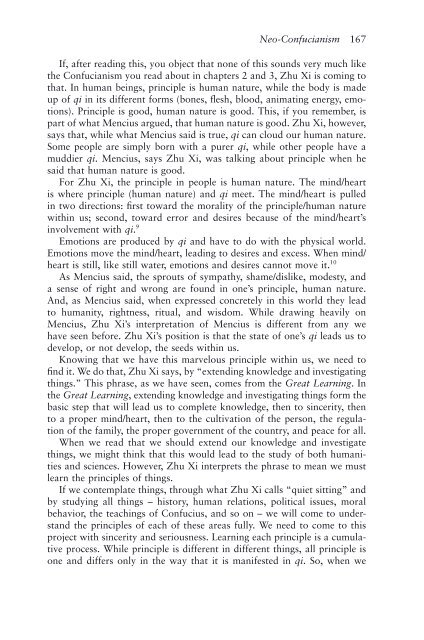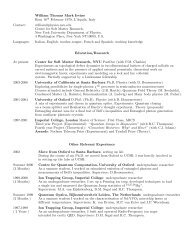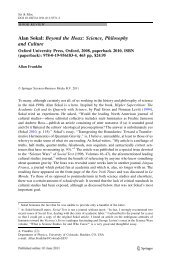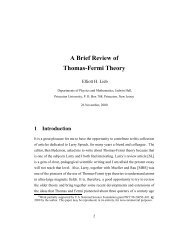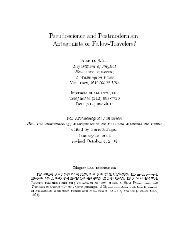Good Confucianism book (pdf) - Department of Physics
Good Confucianism book (pdf) - Department of Physics
Good Confucianism book (pdf) - Department of Physics
Create successful ePaper yourself
Turn your PDF publications into a flip-book with our unique Google optimized e-Paper software.
Neo-<strong>Confucianism</strong> 167If, after reading this, you object that none <strong>of</strong> this sounds very much likethe <strong>Confucianism</strong> you read about in chapters 2 and 3 , Zhu Xi is coming tothat. In human beings, principle is human nature, while the body is madeup <strong>of</strong> qi in its different forms (bones, flesh, blood, animating energy, emotions).Principle is good, human nature is good. This, if you remember, ispart <strong>of</strong> what Mencius argued, that human nature is good. Zhu Xi, however,says that, while what Mencius said is true, qi can cloud our human nature.Some people are simply born with a purer qi , while other people have amuddier qi . Mencius, says Zhu Xi, was talking about principle when hesaid that human nature is good.For Zhu Xi, the principle in people is human nature. The mind/heartis where principle (human nature) and qi meet. The mind/heart is pulledin two directions: first toward the morality <strong>of</strong> the principle/human naturewithin us; second, toward error and desires because <strong>of</strong> the mind/heart ’ sinvolvement with qi . 9Emotions are produced by qi and have to do with the physical world.Emotions move the mind/heart, leading to desires and excess. When mind/heart is still, like still water, emotions and desires cannot move it. 10As Mencius said, the sprouts <strong>of</strong> sympathy, shame/dislike, modesty, anda sense <strong>of</strong> right and wrong are found in one ’ s principle, human nature.And, as Mencius said, when expressed concretely in this world they leadto humanity, rightness, ritual, and wisdom. While drawing heavily onMencius, Zhu Xi ’ s interpretation <strong>of</strong> Mencius is different from any wehave seen before. Zhu Xi ’ s position is that the state <strong>of</strong> one ’ s qi leads us todevelop, or not develop, the seeds within us.Knowing that we have this marvelous principle within us, we need t<strong>of</strong>ind it. We do that, Zhu Xi says, by “ extending knowledge and investigatingthings. ” This phrase, as we have seen, comes from the Great Learning . Inthe Great Learning , extending knowledge and investigating things form thebasic step that will lead us to complete knowledge, then to sincerity, thento a proper mind/heart, then to the cultivation <strong>of</strong> the person, the regulation<strong>of</strong> the family, the proper government <strong>of</strong> the country, and peace for all.When we read that we should extend our knowledge and investigatethings, we might think that this would lead to the study <strong>of</strong> both humanitiesand sciences. However, Zhu Xi interprets the phrase to mean we mustlearn the principles <strong>of</strong> things.If we contemplate things, through what Zhu Xi calls “ quiet sitting ” andby studying all things – history, human relations, political issues, moralbehavior, the teachings <strong>of</strong> Confucius, and so on – we will come to understandthe principles <strong>of</strong> each <strong>of</strong> these areas fully. We need to come to thisproject with sincerity and seriousness. Learning each principle is a cumulativeprocess. While principle is different in different things, all principle isone and differs only in the way that it is manifested in qi . So, when we


